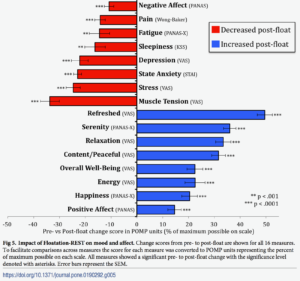This is really exciting news! Dr. Justin Feinstein and his team at the Laureate Institute for Brain Research (LIBR) have published their first peer-reviewed study on floating. Here’s a quick summary:
- They floated clinically anxious and depressed people once each and measured their anxiety state shortly before and after floating. That is, people who had an anxiety-related diagnosis from a psychiatrist, like Generalized Anxiety Disorder, Social Anxiety Disorder, Panic Disorder, Agoraphobia, and/or PTSD.
- Without exception, everyone was less anxious after floating. The more severely anxious they’d been at the start, the more significant the effect
- People reported significant reductions in stress, muscle tension, pain, depression and negative affect, and significant improvements in serenity, relaxation, happiness and overall well-being (p < .0001 for all variables)
- The paper says nothing about why the changes happen, or how long the effects might last for, or how often one “should” float.

Selected Quotes:
Overall, how was your float today? / “It was amazing. It was like floating on air. No cares in the world. No worries.” —Subject 14
What did you think about, if anything, while you were floating? / “Mostly like the stress with our little house fire and stuff. And losing the kids after that. But it wasn’t like unbearable like how it is every other day when I’m thinking about it. It was — I don’t know — like I could think about it without getting depressed or feeling like I wanna just take a shot or pop some pills.” —Subject 9
Did you learn anything about yourself during this experience? / “I need to buy one of those.” —Subject 42
In case you missed it above, here’s the link to the study: https://gallery.mailchimp.com/cf648477ee8696ff33425e9a0/files/4e38f49b-079b-4816-bbf6-c3beb2f77f1d/Feinstein_Floatation_REST_anxiety_and_depression_2018.pdf
And here’s an article that might be helpful… How to read and understand a scientific paper: a guide for non-scientists.
We’ll be returning to this study, as there’s much more there to share. 60 pages of there, in fact. Stay with us!